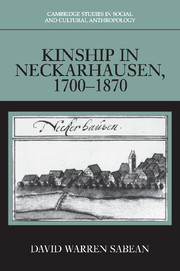Book contents
- Frontmatter
- Contents
- List of tables
- Abbreviations
- Abbreviations of sources
- On reading kinship diagrams
- Glossary
- Preface
- Introduction
- 1 An introduction to kinship
- 2 Vetterleswirtschaft: Rise and fall of a political discourse
- 3 The politics of incest and the ecology of alliance formation
- Cohort I (1700–1709)
- Cohort II (1740–1749)
- Cohort III (1780–1789)
- Cohort IV (1820–1829)
- Cohort V (1860–1869)
- Conclusion
- Appendix
- Bibliography
- General index
- Index of villagers
2 - Vetterleswirtschaft: Rise and fall of a political discourse
Published online by Cambridge University Press: 04 August 2010
- Frontmatter
- Contents
- List of tables
- Abbreviations
- Abbreviations of sources
- On reading kinship diagrams
- Glossary
- Preface
- Introduction
- 1 An introduction to kinship
- 2 Vetterleswirtschaft: Rise and fall of a political discourse
- 3 The politics of incest and the ecology of alliance formation
- Cohort I (1700–1709)
- Cohort II (1740–1749)
- Cohort III (1780–1789)
- Cohort IV (1820–1829)
- Cohort V (1860–1869)
- Conclusion
- Appendix
- Bibliography
- General index
- Index of villagers
Summary
This study deals with a period of Württemberg rural history when a particular aspect of kinship became a charged political issue. The term “Vetter” (cousin) reverberates throughout the texts from the 1740s through the 1820s, usually in the context of social or political controversy. There are indications that by the second half of the eighteenth century oligarchical structures, coordinated through familial alliances, dominated the chief civil and ecclesiastical institutions of the country as well as county (Oberamt) and local government. In this chapter, I consider the origins of the specific discourse about cousins and differentiate the kinship logic of that period from what went before and after. My central concern is the formation of the particular language of kinship that accompanied a redeployment of power at the level of the village magistrates. People frequently referred to a local court as a Vetter-Gericht or Vetterlesgericht, alluding to the fact that its members were all closely related and acted as a tightly organized syndicate to coordinate the use of village resources, to dispense patronage, to channel various emoluments to themselves, and to defraud the central government of taxes, tithes, and other sources of income. The different ways kinship was talked about from period to period reflected considerable differences in social practice and the constitution of authority and power in village life.
- Type
- Chapter
- Information
- Kinship in Neckarhausen, 1700–1870 , pp. 37 - 62Publisher: Cambridge University PressPrint publication year: 1997

